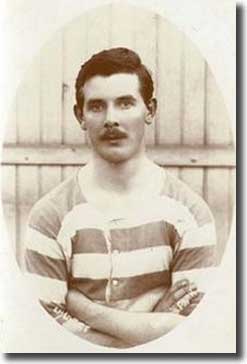 Evelyn Lintott was one of the most celebrated footballers ever to
wear the colours of Leeds City, a full England international and a man
who resolutely maintained the finer aspects of the Corinthian age; he
was one of the earliest leaders of the Professional Footballers Association,
though for many years he retained his status as an amateur so he could
continue in his chosen profession of school teacher. He was one of the
first players to sign up for the armed forces after the outbreak of the
Great War and he lost his life in action on the first day of the Battle
of the Somme in 1916.
Evelyn Lintott was one of the most celebrated footballers ever to
wear the colours of Leeds City, a full England international and a man
who resolutely maintained the finer aspects of the Corinthian age; he
was one of the earliest leaders of the Professional Footballers Association,
though for many years he retained his status as an amateur so he could
continue in his chosen profession of school teacher. He was one of the
first players to sign up for the armed forces after the outbreak of the
Great War and he lost his life in action on the first day of the Battle
of the Somme in 1916.
Lintott was a gifted and astute footballer, sound and resolute in defence,
always ready to spring an attacking move with accurate, controlled passing
from the rear and adept and powerful in the air, the perfect embodiment
of what was expected of a centre-half in the Edwardian period. He was
possibly past his peak when he signed for Leeds City in 1912, but he
showed that first season that he was still a class act and he was a
mainstay of Herbert Chapman's
early days at Elland Road.
Born at Godalming, Surrey, on 2 November 1883, Evelyn Henry Lintott was
the son of Arthur and Eleanor Lintott. His father earned a living from
trading in cattle. Evelyn was the second of five children: his older brother
Frederick was the Bradford Daily Telegraph reporter, 'Preceptor',
and he had two other brothers and one sister. The family lived at Farncombe
in Surrey.
Lintott combined his love of football with training to be a school
teacher. He was educated at King Edward VI Grammar School in Guildford
and then moved on to St Luke's Training College in Exeter. While there
he continued to play on a part time basis for Woking and captained them
in the 1905/06 season when he also represented Surrey. After graduating
from St Lukes, Lintott joined Plymouth Argyle of the Southern League
in 1906 as an amateur; by now he was earning a living as a teacher.
Lintott played only twice for Plymouth but won an England amateur cap
in 1906 during an overseas tour. He played left-half in the 15-0 win
over France, during which the legendary Vivian Woodward scored eight
goals.
The lives of Lintott and Woodward were linked, seemingly inextricably,
with the two both retaining their amateur status, playing for a number
of years with rival clubs in the Southern League, starring together
in the full England side and then going on to join the Footballers'
Battalion after the outbreak of war.
Lintott moved from Plymouth to their Southern League rivals Queens
Park Rangers in 1907, retaining his amateur terms. He made his debut
for the London club against New Brompton on 7 September. He generally
played at right-half, though he appeared occasionally in the forward
line. By now he was combining football action with teaching at a school
in Willesden, North London.
Rangers won the Southern League championship in 1908 and were consequently
invited to play Football League champions Manchester United in the first
staging of the FA Charity Shield. The two teams met at Stamford Bridge
on 27 April and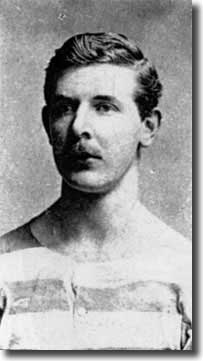 battled out a 1-1 draw, though United won the replay 4-0.
battled out a 1-1 draw, though United won the replay 4-0.
By now Lintott had won five amateur caps for England; he broke into the
full England team in 1908 when he played in all three Home Internationals.
According to future Leeds City teamate and football writer Ivan Sharpe,
Lintott 'received the England selectors' verdict on account of his bubbling
enthusiasm, enterprise and brilliance'.
He rubber stamped his selection with a promising performance for the
South in a trial match against the North on 27 January 1908. The Times:
'For two-thirds of the game, the South showed themselves distinctly the
better side, and with less than half an hour left they led by four goals
to one. The North, however, just afterwards secured a second point after
a free kick following on a foul and, playing up with great dash and determination,
they succeeded in drawing the match at four goals all… Although robbed
of a victory, the South showed themselves decidedly the cleverer side.
Woodward, Hilsdon and Windridge, the inside-forwards, worked admirably
together and Pentland and Mouncher both showed a fine turn of speed. Wedlock
tired towards the finish, but his resolute tackling had much to do with
the lack of success attending the efforts of the North during the opening
part of the game. Ducat and Lintott, the other half-backs, fully justified
their selection.'
Lintott's full debut for England came on 15 February 1908 against Ireland
in Belfast. The English won 3-1. Among his teammates that day were such
greats as Blackburn's Bob Crompton, Jesse Pennington of West Bromwich
Albion, Billy 'Fatty' Wedlock of Bristol City and old acquaintance Vivian
Woodward. Lintott thus became the first QPR player ever to play for England
and the final one for more than sixty years. The Times reported
that Lintott 'made a most promising first appearance in international
football'.
back to top
The amateur retained his place and in his second full international,
on 16 March at Wrexham, England beat Wales 7-1 with Woodward getting
a hat trick. Lintott was pitted against the legendary Billy Meredith
and played so soundly that the Welshman was rendered almost a passenger.
Sir Frederick Wall, secretary of the Football Association, wrote thus
in 50 Years of Football: 'A good story relates to the Wales v England
match on Wrexham Racecourse in 1908. It was disastrous to Wales, for that
was the occasion when L R Roose was injured, and in the second half Dai
Davies was allowed to keep goal.
'Evelyn Lintott, the talented schoolmaster, who was so fine a left half-back,
played in all the big matches of 1907/08, and on this occasion he was
ordered never to leave Meredith. He clung to him like an affectionate
brother.
'At last the patience of Meredith gave out and he turned on Lintott with
these words: "Go away, you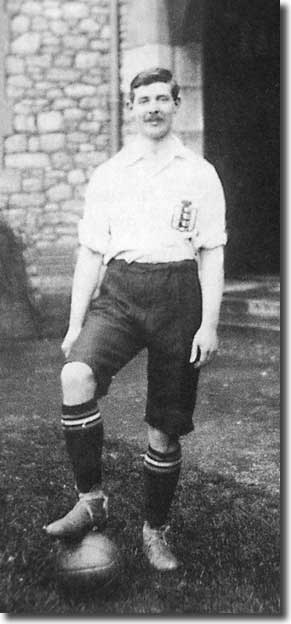 confounded schoolboy. Go away! Do you hear? You have got seven cursed
goals, how many more do you want?"
confounded schoolboy. Go away! Do you hear? You have got seven cursed
goals, how many more do you want?"
'Lintott was silent, but he continued to haunt his jaded adversary. Wales
have had lots of fine players, but their football prince remains Meredith
the magnificent."
While making full international appearances and starring for his club,
Lintott somehow found time to continue representing England at amateur
level, as well as appearing in a number of trial matches.
Lintott's performances for Rangers and England attracted the attention
of First Division Bradford City in 1908. Bantams manager Peter O'Rourke
arranged to meet Lintott at Paddington Station after Rangers' return
from a game at Swindon on 21 November. After 35 appearances and one
goal for QPR, Lintott happily signed for the West Yorkshire club.
Rangers were in some financial difficulties at the time and asked Lintott
to turn professional before the move so that they could demand a fee
for him. He agreed to do so and the West Londoners were therefore able
to bank a transfer fee in excess of £1,000, effectively solving their
cash flow problems.
Lintott won a further four England caps while he was at Valley Parade,
also appearing (and scoring) for the Football League against the Irish
League.
On 13 February 1909, Lintott appeared for England on his home pitch at
Valley Parade in Bradford as they defeated Ireland 4-0. The Times
noted that he 'played quite as well as last year when he took part in
the three international games'.
His seventh and final cap came against Hungary on 31 May 1909, when
England won 8-2, with Vivian Woodward scoring four of the goals.
Lintott's international career brought almost unparalleled success:
six of his appearances resulted in victory, the one exception being
a 1-1 draw with Scotland. The goals record in those seven games was
a remarkable 29-7.
When he signed for Bradford, the Bantams arranged employment for Lintott
at Sports and Pastimes, the company that manufactured their shirts,
but he decided instead to return to teaching and took a job at Dudley
Hill. He was integrally involved when the Professional Footballers'
Association was formed and was appointed chairman in 1910.
Bradford had won promotion to the top flight as Second Division champions
months before they signed Lintott in 1908. However, they were struggling
badly to come to terms with First Division football.
The day that Lintott signed, the Bantams lost 2-0 at Manchester United
and slumped to the bottom of the table, with just six points and seven
goals from 13 games.
Bantamspast.co.uk: 'Inevitably, City found the going tough amongst
the elite. They entered the last game of the season knowing only victory
over Manchester United would be enough to ensure their survival. Valley
Parade was packed, over 30,000 saw a tense and breathless match. City
took the lead thanks to prolific striker Frank O'Rourke in the second
half.
'As the clock ticked down, City's goal was subjected to a tremendous
assault by the visitors. City grimly hung on, but minutes from time goalkeeper
Mark Mellors was knocked out as he saved a fearsome drive. He was literally
propped up in the goal whilst 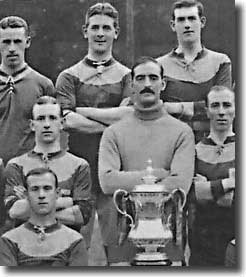 City
defended the resulting corner.
City
defended the resulting corner.
'City's chairman could not take the pressure and was seen pacing Valley
Parade itself as the agony went on. City scrambled the corner clear and
soon after relief came with the final whistle. Fans raced onto the pitch
and hero of the hour Mellors was carried shoulder high from the pitch.'
Things were less panic-stricken the following season when Bradford finished
a comfortable seventh. A year later they enjoyed remarkable success, finishing
fifth in the league, just seven points behind champions Manchester United,
and carried off the FA Cup. Lintott did not figure in either the final
or the replay against Newcastle United, which was settled by a goal from
Bradford skipper Jimmy Speirs, a future colleague of Lintott's at Leeds
City.
back to top
After 57 appearances for Bradford over four seasons, Lintott was courted
by Leeds City manager Herbert Chapman and signed for the Peacocks in
June 1912.
As part of the deal, Chapman agreed to pay Lintott a full year's salary
of £208 for the ten months to the following April. This meant that the
player was receiving more than the maximum wage.
That summer Chapman agreed similar deals with two other international
signings, Billy Scott and George Law. When
Chapman identified the mistake that had been made, he persuaded City's
directors to raise the matter with the League Management Committee and
plead for clemency. His honesty backfired and the League fined City
£125, also censuring Chapman and the players, who were ordered to repay
the excess amount to the club.
There was significant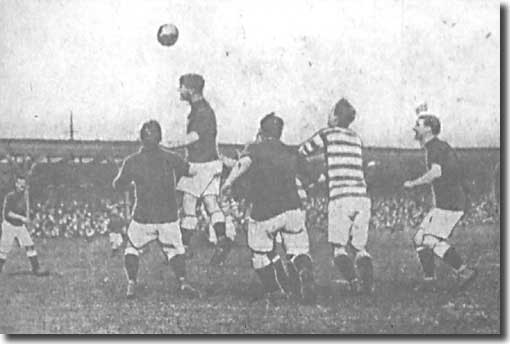 interest in how the former England man would do at Elland Road. The Leeds
Mercury reported, during pre-season preparations, 'Of the newcomers
it was gratifying to see Evelyn Lintott so far recovered as to give a
really fine exhibition. This erstwhile warrior was ever in the thick of
it, and on Saturday's form has evidently recovered from his serious injury
when playing with Bradford City.'
interest in how the former England man would do at Elland Road. The Leeds
Mercury reported, during pre-season preparations, 'Of the newcomers
it was gratifying to see Evelyn Lintott so far recovered as to give a
really fine exhibition. This erstwhile warrior was ever in the thick of
it, and on Saturday's form has evidently recovered from his serious injury
when playing with Bradford City.'
Lintott's debut for Leeds came at centre-half, at Fulham on 7 September,
the opening day of the season, but
it was no dream beginning: City were beaten 4-0. Nevertheless, Sportsman,
writing for the Yorkshire Evening Post, reported on a promising
personal display: 'There was no more energetic man on the field than he,
though he met with no success until he had taken a little time to settle
down, and then he had to bear the brunt of the attack, which he did right
well, especially when it is known that he was up against Pearce, a young
man, who seems destined to secure the highest honours of the game. In
the second half, when the locals were resting a little on their laurels
- all four goals were scored before half time - Lintott was seen at his
best in an aggressive mood, and after seeing several chances he gave to
his forwards frittered away, he tried hard himself to score, but with
no better luck.'
The Mercury added: 'Lintott had always played magnificently. Strong
in defence, he also found the opportunity to do nearly all the dangerous
shooting that was accomplished on behalf of Leeds.'
The new man also had to carry the burden of being the club's new captain,
but he shouldered it confidently, and was soon proving he had lost none
of his old ability. After his second game, a 2-0 defeat of Barnsley, Yorkist
wrote in the Mercury, 'Lintott gave a fine display of clean tackling,
smart headwork and clever placing. He worked with untiring energy and
was to a large extent responsible for the ineffectiveness of the Barnsley
forwards. Lintott looks like proving an ideal captain, and in him Leeds
City have certainly found a treasure. He is the sort of leader who by
his play and general conduct on the field encourages and inspires his
colleagues.'
Lintott was an ever present that season as City finished sixth in the
table, not bad going for a side that the previous season had to apply
for re-election to the League. The centre-half gave many fine displays
and was one of the stalwarts of the side.
In March 1913, England selectors came to watch Lintott and City team
mate Billy McLeod against Bury, prompting speculation of an international
recall, but nothing came of their interest.
For the 1913/14 campaign, Lintott
moved to right-half to accommodate former Northampton 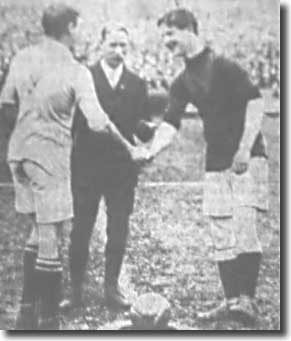 centre-half
Jack Hampson in his favoured role. He had usually figured at wing-half
when at Bradford City, but was no longer accustomed to the role. The Yorkshire
Post reported the opening game of the season, a 3-0 defeat of Glossop,
as follows. 'Granted that Hampson suffered the physical handicap of having
to play for three parts of the game with his eye cut and bleeding, it
is still matter for doubt whether he has qualifications which justify
his displacement of Lintott to the left-half position. The latter, though
always preferred at left-half in his Bradford City days, has played so
long in the centre as to have become unfitted for any other position,
and on Saturday he was so completely out of his element as to become ineffective.'
centre-half
Jack Hampson in his favoured role. He had usually figured at wing-half
when at Bradford City, but was no longer accustomed to the role. The Yorkshire
Post reported the opening game of the season, a 3-0 defeat of Glossop,
as follows. 'Granted that Hampson suffered the physical handicap of having
to play for three parts of the game with his eye cut and bleeding, it
is still matter for doubt whether he has qualifications which justify
his displacement of Lintott to the left-half position. The latter, though
always preferred at left-half in his Bradford City days, has played so
long in the centre as to have become unfitted for any other position,
and on Saturday he was so completely out of his element as to become ineffective.'
After the defeat at Stockport which followed, the Post commented:
'The experiment of playing Lintott at right half-back has not proved an
unqualified success. Obviously, he is more at home in the centre, where
he did splendid service last season.'
George Law replaced him for the game on 20 September against Bradford
Park Avenue, prompting this in the Mercury. 'The halves and backs
played a sound defensive game all through, but there were many who asked,
"Where is Lintott?" The City captain was unable to play owing
to an injured ankle. Law, however, who deputised, did much that was good,
and Hampson proved himself to be a clever pivot, whose work was very effective.'
back to top
It was 8 November before Lintott returned to the team. In his absence
Hampson faced continual carping from the press and was compared unfavourably
to his illustrious predecessor. It was a while before he settled into
his best form. Hampson had been a mainstay of Chapman's Northampton side
and the manager persevered with him, limiting Lintott's contribution to
six appearances all season.
He would probably have played on, despite being out of favour, but
the onset of war brought a swift decision. Shortly after the
outbreak of the First World War, Lintott decided to sign up for
the Army. On 14 September 1914, frustrated at delays in recruiting in
Bradford, he joined up at Leeds with the 15th Battalion West Yorkshire
Regiment (Prince of Wales Own): the 'Leeds Pals'. He was still living
in Bradford and gave his address as 13 Cornwall Place, Manningham, yards
from Valley Parade itself. On his enlistment form he cited his occupation
as school teacher rather than professional footballer.
Lintott left Leeds with his unit on 25 September 1914 en route to Masham
and training in the Yorkshire Dales.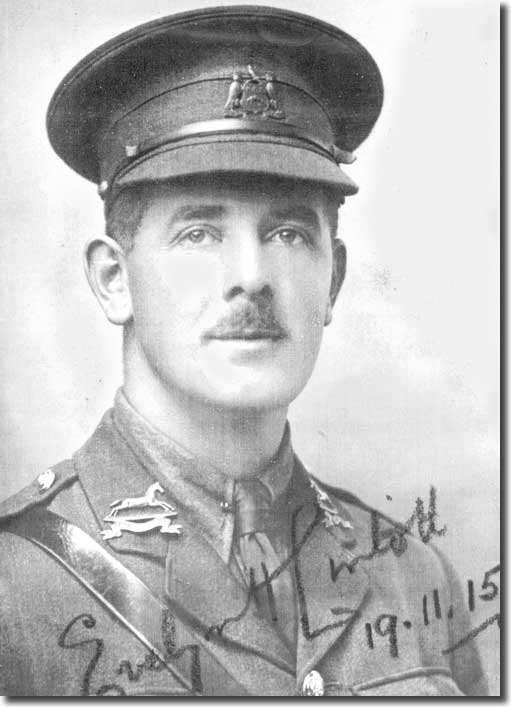 Over 20,000 locals gave the men
a rousing send off.
Over 20,000 locals gave the men
a rousing send off.
Lintott was quickly promoted to Sergeant and by 20 December 1914 he
became a Lieutenant, the first professional footballer to gain a commission.
In late June 1915, they moved to Ripon, where they met up with the 1st
and 2nd Bradford Pals, as well as the 18th Durham Light Infantry.
Earlier in December the Leeds and Bradford Pals boarded the liner Empress
of Britain at Liverpool, bound for Egypt, to guard the Suez Canal. A
minor collision with the French mail ship Dajurjura forced an unscheduled
stop at Malta for repairs. Despite an encounter with a submarine, they
landed safely at Port Said on 21 December 1914.
In January 1915, The Times reported: 'More than 200 recruits have
been enrolled in London for the Football Battalion of the Middlesex Regiment,
in addition to 400 from other districts. Among the recruits are several
Rugby international players of England, Ireland and Scotland, and the
officers include more than one Double Blue. The commanding officer is
Colonel C F Grantham, late of the Indian Army, and commissions have been
given among others to Vivian J Woodward and Evelyn H Lintott, two well
known players.'
After three months in Egypt, the Pals boarded the troop ship Asconia
on 1 March 1915 en route for France. They landed at Marseilles and were
transported to the Front in time for the assault on the Somme.
Lintott was killed in action on the first day of the notorious Battle
of the Somme on 1 July 1916, aged 33. His death was officially reported
by Private David Spink. The report read 'Lieutenant Lintott killed by
machine gun at 3pm in the advance. He was struck in the chest.'
More detail was forthcoming in a letter to the Yorkshire Post.
It described his last moments: 'Lieutenant Lintott's end was particularly
gallant. Tragically, he was killed leading his platoon of the 15th West
Yorkshire Regiment, The Leeds Pals, over the top. He led his men with
great dash and when hit the first time declined to take the count. Instead,
he drew his revolver and called for further effort. Again he was hit but
struggled on but a third shot finally bowled him over.'
Lintott's body was never found, but he is commemorated on the Thiepval
Memorial to the Missing. It has 72,000 names of British and Commonwealth
troops killed during the Battle of the Somme who have no known grave.
Thus passed a remarkable footballer and all-round great man.
back to top











 Evelyn Lintott was one of the most celebrated footballers ever to
wear the colours of Leeds City, a full England international and a man
who resolutely maintained the finer aspects of the Corinthian age; he
was one of the earliest leaders of the Professional Footballers Association,
though for many years he retained his status as an amateur so he could
continue in his chosen profession of school teacher. He was one of the
first players to sign up for the armed forces after the outbreak of the
Great War and he lost his life in action on the first day of the Battle
of the Somme in 1916.
Evelyn Lintott was one of the most celebrated footballers ever to
wear the colours of Leeds City, a full England international and a man
who resolutely maintained the finer aspects of the Corinthian age; he
was one of the earliest leaders of the Professional Footballers Association,
though for many years he retained his status as an amateur so he could
continue in his chosen profession of school teacher. He was one of the
first players to sign up for the armed forces after the outbreak of the
Great War and he lost his life in action on the first day of the Battle
of the Somme in 1916. battled out a 1-1 draw, though United won the replay 4-0.
battled out a 1-1 draw, though United won the replay 4-0. confounded schoolboy. Go away! Do you hear? You have got seven cursed
goals, how many more do you want?"
confounded schoolboy. Go away! Do you hear? You have got seven cursed
goals, how many more do you want?" City
defended the resulting corner.
City
defended the resulting corner. interest in how the former England man would do at Elland Road. The Leeds
Mercury reported, during pre-season preparations, 'Of the newcomers
it was gratifying to see Evelyn Lintott so far recovered as to give a
really fine exhibition. This erstwhile warrior was ever in the thick of
it, and on Saturday's form has evidently recovered from his serious injury
when playing with Bradford City.'
interest in how the former England man would do at Elland Road. The Leeds
Mercury reported, during pre-season preparations, 'Of the newcomers
it was gratifying to see Evelyn Lintott so far recovered as to give a
really fine exhibition. This erstwhile warrior was ever in the thick of
it, and on Saturday's form has evidently recovered from his serious injury
when playing with Bradford City.' centre-half
Jack Hampson in his favoured role. He had usually figured at wing-half
when at Bradford City, but was no longer accustomed to the role. The Yorkshire
Post reported the opening game of the season, a 3-0 defeat of Glossop,
as follows. 'Granted that Hampson suffered the physical handicap of having
to play for three parts of the game with his eye cut and bleeding, it
is still matter for doubt whether he has qualifications which justify
his displacement of Lintott to the left-half position. The latter, though
always preferred at left-half in his Bradford City days, has played so
long in the centre as to have become unfitted for any other position,
and on Saturday he was so completely out of his element as to become ineffective.'
centre-half
Jack Hampson in his favoured role. He had usually figured at wing-half
when at Bradford City, but was no longer accustomed to the role. The Yorkshire
Post reported the opening game of the season, a 3-0 defeat of Glossop,
as follows. 'Granted that Hampson suffered the physical handicap of having
to play for three parts of the game with his eye cut and bleeding, it
is still matter for doubt whether he has qualifications which justify
his displacement of Lintott to the left-half position. The latter, though
always preferred at left-half in his Bradford City days, has played so
long in the centre as to have become unfitted for any other position,
and on Saturday he was so completely out of his element as to become ineffective.' Over 20,000 locals gave the men
a rousing send off.
Over 20,000 locals gave the men
a rousing send off.